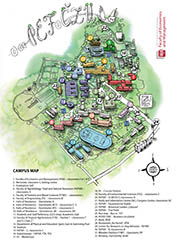
PRAGUE
Prague is a cultural, historical, social and political center of Central European activities. It is Prague Castle, the seat of the President of the Republic, which dominates over the city. The Castle was founded at the end of the ninth century. The historical parts of the city were mostly built and developed during the reign of the King and Emperor Charles IV who, among others, founded the university in Prague in 1348, making it the first one north of the Alps. Under Charles IV, Prague was the capital of the Holy Roman Empire.
Besides being the seat of the President, Prague also houses the Parliament, Cabinet and other supreme state bodies of the Czech Republic. The capital is also the seat of the highest dignitaries of the church and of other significant national and state institutions. Prague is a venue of important local and international political, cultural, social and scientific events, congresses, conferences and festivals among which the Prague Spring Music Festival is ranked as the most popular.
Following the fundamental political and social changes in 1989, Prague is again becoming a significant place for tourists from all over the world. Since that year the tourist infrastructure has been rapidly developing and its quality can now be compared with those in traditional European cities of democratic countries.
Today Prague is an ideal place for foreign investors' activities, which are important and are supported both by the state authorities and by the City. One such successful project with foreign participation is, among others, the construction of the multifunctional building Myslbek, or the Dancing House called "Ginger and Fred".
The significant position of Prague in the cultural sphere of our continent has been acknowledged also by the honorary title „European City of Culture of the Year 2000" awarded to our city. Prague is currently one of Europe's most popular City break destinations.
Prague is not only a tourist attraction but also an important European Business Center. The Czech Republic is now one of the fastest growing economies is Europe. More info at http://en.wikipedia.org/wiki/Czech_Republic
CZECH REPUBLIC
The Czech Republic is a landlocked country in Central Europe. The country is bordered by Germany to the west, Austria to the south, Slovakia to the east and Poland to the north. Its capital and largest city, with 1.3 million inhabitants, is Prague. The Czech Republic includes the historical territories of Bohemia and Moravia, as well as a small part of Silesia.
In 2006, the Czech Republic became first former member of the Comecon to achieve the status of a developed country according to the World Bank. In addition, the country has the highest level of human development in Central and Eastern Europe, ranking among the top 30 nations in the world. The Czech Republic ranks as the ninth-most peaceful country in Europe, while achieving the best performance in democratic governance and infant mortality in the region. It is a pluralist parliamentary representative democracy with membership in the European Union, NATO, the OECD, the OSCE, the Council of Europe and theVisegrád Group.
Area: 78 866 km2
Population: 10 513 209
Legislature: Parliament
Capital: Prague


